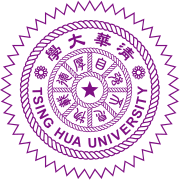 401-500
401-500 


National Tsing Hua University (NTHU) was first established in Beijing, China in 1911 and re-established in Hsinchu, Taiwan in 1956. On the 1st of November 2016, NTHU merged with the National Hsinchu University of Education (NHCUE). NTHU is located in Hsinchu, a city 72 kilometers south of Taipei. The campus covers an area over 120.1678 hectares (296.94184 acres) of scenic land and is strategically situated among many prestigious research institutes and universities such as: the Industrial Technology Research Institute (ITRI), National Synchrotron Radiation Research Center, National Center for High-Performance Computing, Food Industry Research and Development Institute, National Chiao Tung University, Chung Hua University, and the Hsinchu Science-Based Industrial Park. At present, NTHU consists of 12 colleges, 26 departments, 31 graduate institutes, as well as 12 bachelor’s degree, 20 master's degree and 14 doctoral degree programs. The 12 colleges are: College of Science, College of Engineering, College of Nuclear Science, College of Humanities and Social Sciences, College of Life Sciences and Medicine, College of Electrical Engineering and Computer Science, College of Technology Management, College of Education, College of Arts, Tsing Hua College, The Taipei School of Economics and Political Science and College of Semiconductor Research. As of the Fall Semester of 2023, NTHU employs 871 faculty members and enrolls 18,367 students, among them 9,275 are undergraduates, 7,427 in the master programs and 1,665 in the doctoral programs. NTHU emphasizes interdisciplinary approach. In addition to upholding basic education, our undergraduate programs are designed to maximize flexibility as well as integration. Students are encouraged to cross disciplinary boundary to pursue their minor or double-major degrees programs. To be admitted to NTHU’s undergraduate program, most students need to pass the college entrance examination. Others with special qualifications, however, may be admitted through various admission schemes. International students can apply directly to the Office of Global Affairs. For the master programs, student must have a baccalaureate degree and pass an entrance examination administered by various Institutes. Outstanding students may be directly admitted through a special and competitive selection process. The same is true for those wishing to be admitted to the doctoral programs. There are 179 student clubs, each classified into nine categories: academic, skill-based, music, service-oriented, sports, art, general interest, student autonomous, and functional. The university has excellent recreational and sport facilities, such as gymnasium, swimming pools, various kinds of ball courts, track and field. There are, in addition, 25 student dormitories with a maximum capacity to house 8,438 students on our campus. Many faculty members also live on campus and creating an integrated university community where students and faculty members can interact outside of classrooms and laboratories.
 401-500
401-500 
| Subject | Rank |
|---|---|
Nanoscience & Nanotechnology | 51-75 |
Artificial Intelligence | 76-100 |
Instruments Science & Technology | 101-150 |
Biomedical Engineering | 101-150 |
Materials Science & Engineering | 101-150 |
Management | 101-150 |
Chemical Engineering | 151-200 |
Physics | 201-300 |


| Undergraduate Programs |
|---|
Department of Mathematics |
Department of Physics |
Department of Chemistry |
Department of Chemical Engineering |
Department of Power Mechanical Engineering |
Department of Materials Science and Engineering |
Department of Industrial Engineering and Engineering Management |
Department of Engineering and System Science |
Department of Biomedical Engineering and Environmental Sciences |
Department of Chinese Literature |
Department of Foreign Languages and Literature |
Department of Life Science |
Department of Medical Science |
Department of Computer Science |
Department of Electrical Engineering |
Department of Quantitative Finance |
Department of Economics |
Department of Education and Learning Technology |
Department of Early Childhood Education |
Department of Special Education |
Department of Educational Psychology and Counseling |
Department of Kinesiology |
Department of English Instruction |
Department of Environmental and Cultural Resources |
Department of Music |
Department of Arts and Design |
| Graduate Programs |
|---|
Institute of Statistics |
Institute of Astronomy |
Institute of Computational and Modeling Science |
Institute of NanoEngineering and MicroSystems |
Institute of Biomedical Engineering |
Institute of Nuclear Engineering and Science |
Institute of Analytical and Environmental Sciences |
Institute of History |
Institute of Linguistics |
Institute of Anthropology |
Institute of Sociology |
Institute of Philosophy |
Institute of Taiwan Literature |
Institute of Sinophone Studies |
Institute of Molecular and Cellular Biology |
Institute of Molecular Medicine |
Institute of Bioinformatics and Structural Biology |
Institute of Biotechnology |
Institute of Systems Neuroscience |
Institute of Communications Engineering |
Institute of Electronics Engineering |
Institute of Information Systems and Applications |
Institute of Photonics Technologies |
Institute of Information Security |
Institute of Technology Management |
Institute of Law for Science and Technology |
Institute of Service Science |
Institute of Learning Sciences and Technologies |
Graduate Institute of Mathematics and Science Education |
Institute of Taiwan Languages and Language Teaching |
Graduate Institute of Art and Technology |